With just 35 minutes of 1999 to go, and as most of the country was preparing to celebrate the arrival of the new millennium, Peter Snow was desperately trying to fill airtime. He was the BBC’s Millennium Bug correspondent on a marathon 28-hour live broadcast called ‘2000 Today’, and every hour or two he would update viewers on which countries had fallen victim while standing in front of a large world map.
The only problem was that the bug did not appear to be striking…anywhere.
At the time the bug was a major worry. The concern was that when the date rolled over to 2000, because computers may only store the date as two digits – ’99’ instead of ‘1999’ – suddenly systems across the world could revert to thinking that it was 1900. Or maybe 1970, the date from which computer systems tended to count. In a connected world, even one with only 1999 levels of connectivity, could the bug inadvertently crash power grids, cause bank vaults to swing open and fire weapons systems? The answer, as everyone now knows, is no. But things weren’t always so certain.
Sure, there were a few strange things that happened, as Peter Snow told viewers who were still sober enough to pay attention. An alarm went off in a Japanese nuclear power plant; Russia fired some missiles into Chechnya. But, as he told viewers, nothing could be definitively attributed to the bug.
In total, the preparations for the non-event were rather expensive. According to a report prepared after the fact, central government spent £380m, of which £150m went on defence. Local government spent another £200m. And with a figure that is wryly amusing from our vantage in 2019, an extra £350m was used to ensure the NHS was ready.
The private sector spent big too. ‘On New Year’s Eve they paid us vast sums of money to watch nothing happen,’ says Nick Haddock, who was a system administrator and worked on bug preparation at insurance firm Royal Sun Alliance.
So was the vast expense and media hysteria worth it?
Once the threat posed by the bug was identified by the industry, it got to work. The major IT vendors of the time, such as Novell, Microsoft and Solaris all released patches for their servers and systems so they would handle the date problem. But that was the easy part. Just as how today we may habitually click the ‘X’ button when Windows nags us to install updates, businesses and individuals needed to be persuaded to actually install the patches and ready their systems.
In Nick’s case, he says that the impetus to prepare for the bug initially came from below – the IT guys – but once the media storm around it reached critical mass, executives started to pay attention.
The government did not sit idly by. Its response was coordinated by the Cabinet Office and it established an organisation called Action 2000, which identified 58 ‘high-level processes’ across 25 sectors that were at risk. This system monitored the progress of each with a “traffic light” system of readiness. For example, financial institutions, gas supplies and transport services were all identified as areas of concern.
For the private sector preparations were similarly crucial. For Royal Sun Alliance, there was a risk that the bug could mean they had no idea when policies could be taken out. Haddock believes that without appropriate planning, companies could have easily gone out of business.
In the immediate run-up to New Year, unlike the much more high profile Millennium Dome debacle, bug preparations appeared to go off without a hitch. In a report published by the National Audit Office on the 11 November 1999, most services, including every police and NHS service, was rated as ready by the end of October, with three months still to go. But leaving nothing to chance, the government established a number of special measures to put into place over the New Year period, such as a special police hotline that would enable police services across the country to feed information back to Whitehall.
So was the millennium bug a genuine threat? Amazingly, despite what we remember now, the answer is actually yes. Nothing happening was no accident: it was actually the result of a lot of hard work by a lot of people.
‘People have no idea of the tens of thousands of people who were involved,’ says Haddock. ‘It was a lot of work, months and months and months of work and planning and organisation. When it happened, it was a non-event because the plan was for it to be a non-event.’
So the reason we don’t remember it that way was because, ultimately, competent experts identified the problem and rolled out a fix before anything disastrous happened. We just don’t remember because it was good news for everyone. Well, everyone but Peter Snow.






Comments